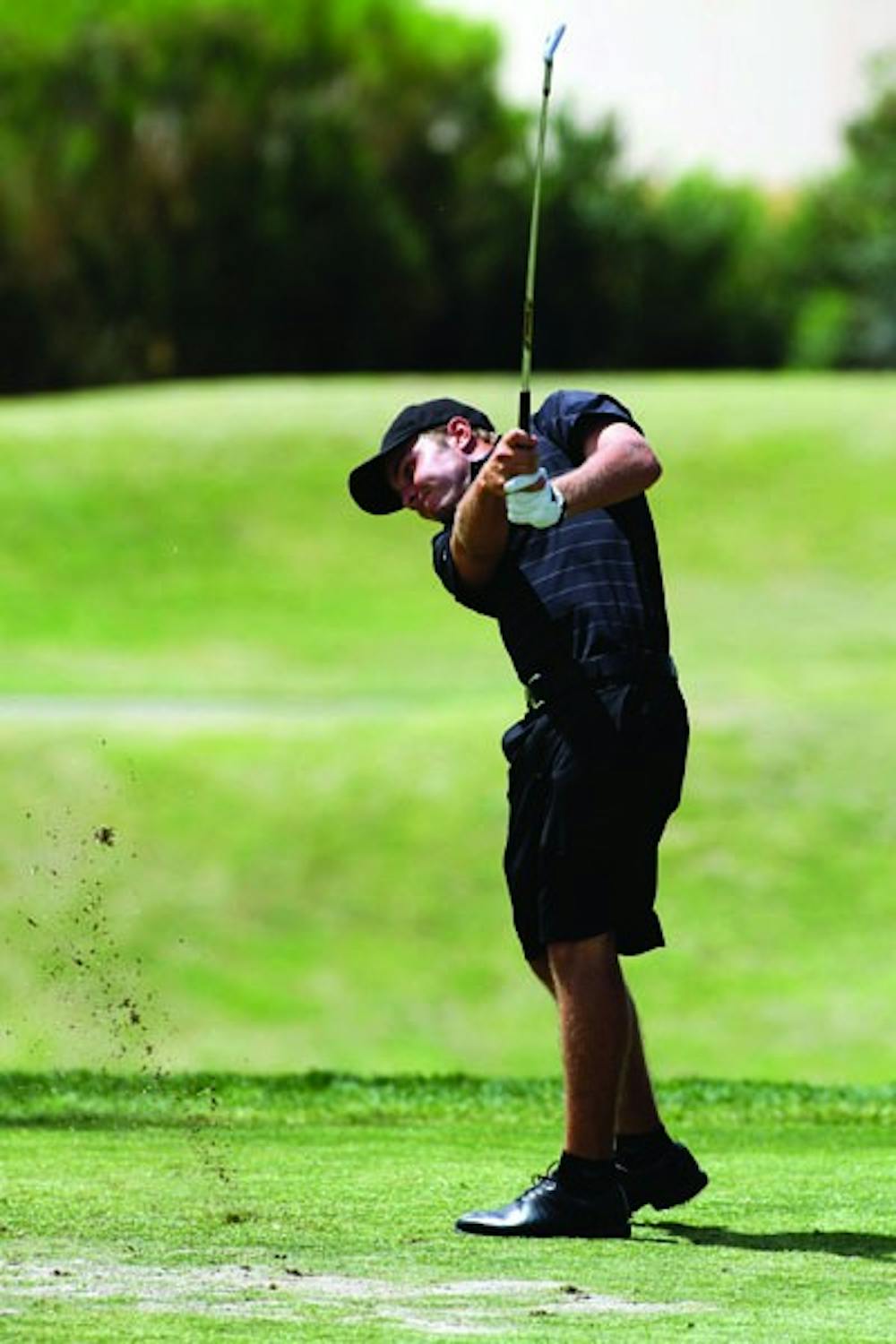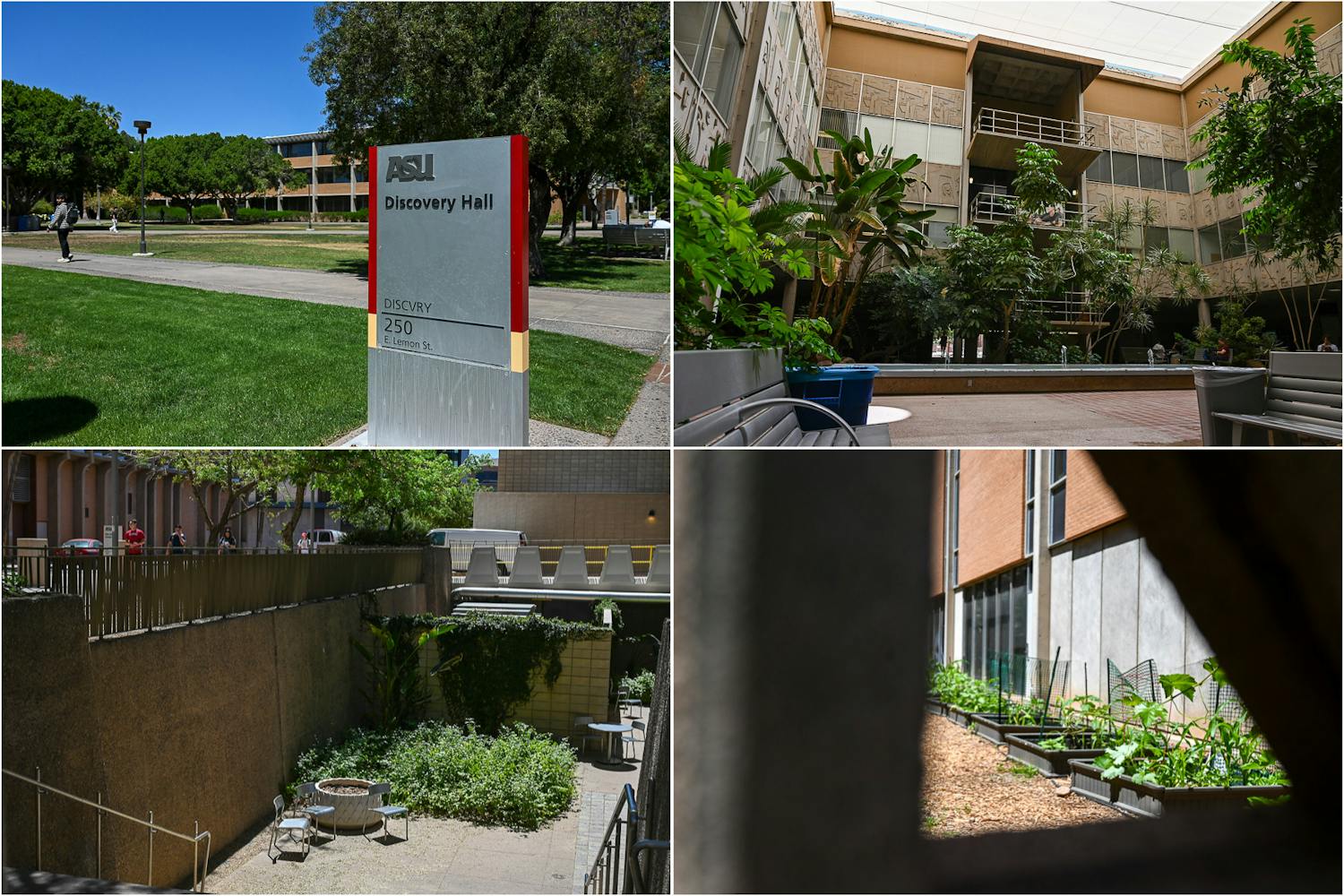Bustling through the line at Chick-Fil-A in the Memorial Union on ASU’s Tempe Campus is a freshman with the laid-back and calm personality of a seasoned golf veteran.
Despite his young age, 20, Austin Quick has seen it all. He came to ASU with big dreams, perhaps a future on the European Golf Tour. However, last semester he had to dial back his expectations as the ASU men’s golf team welcomed six freshmen, a new coach for the first time in 20 years and a whole new way of doing things.
Quick, who was “just kind of good” at golf said his time at Chaparral High school, where he won three state championships, made him contemplate his options of playing the game at a higher level.
“I played golf as a junior just because I grew up around it,” Quick said. “I never really knew I wanted to make it my living until senior year at high school. I got my scholarship to ASU and I just realized I need to do something in my life for myself.
“Having a social life is great and everything. You want to go out, party, have a good time and have a bunch of friends, but I felt like I got my fair share of that in high school. It was fun, but you are put on this world to go do something and make a difference for yourself. You need to go out there and make a name for yourself and be the best you can be.”
While most students were fretting about finals and grades, Quick sat almost at ease, knowing one of the major difficulties was behind him.
The team did not play well this year and there is no avoiding it. It has been a tenuous affair to say the least. The pressure of playing in one of the most prestigious golf programs in the country could have mounted on any of the freshmen playing.
The leadership roles were vacant except for the one occupied by senior Spencer Fletcher, who also lacked experience.
While Quick didn’t immediately assert himself into that position, he continually got stronger as the year went on. His worst tournament, a 73rd place finish in the Olympia Fields Invitational, was the first of his career. His best tournament came near the end of the season with a second place finish in the Thunderbird Invitational. From the start of the school year in September, until the spring heat stifled the Tempe practice facility in April, Quick remained focused to produce for himself and to become the leader the program desperately needs next year.
“Austincertainly this spring has put in a lot of time and effort,” coach Tim Mickelson said. “That’s a big reason why his scores have come down.”
Quick was at practice every day learning how to do the little things right. Quick would go out to the putting green and focus on the five-footers, which make or break even the best of rounds. ASU’s short game was a weakness for the team throughout the whole year. It, along with the finishes, got better as the season wore on, but for a time it was a big problem.
Through the difficulty Quick remained composed, his best quality, according to former-Chaparral teammate Parker Smith.
“He has a competitive nature, but the reason he is such a good golfer is that he carries a really calm attitude with him,” Smith said. “He acts almost careless, but at the same time is still competitive.”
This attitude is why Quick can pull a team together. His ability to create a friendly atmosphere with his teammates allows him to become one of the favorites in the clubhouse. This was apparent when he attended Chaparral and continues to this day.
“He just makes an effort to be friends with everyone and keep a positive nature about him,” Smith said. “He acts as a role model even for people that are older than him.”
With little time to make friends outside the sport, Quick focused on the friendships he could make on the team. Two of the freshmen, Cameron Palmer and David Lowe, were familiar with Quick, having played against him throughout high school. Now they are Quick’s best friends in college, and Quick is quite comfortable with that.
“We are all on the same schedule,” Quick said. “So whenever we have time off we will go out, have our fair share of partying and meeting women and it’s great, but it is tough. The only free time we have is Friday and Saturday basically, because we have workouts during the week … I feel like I can focus on golf and I don’t feel lonely or have to go out and make new friends.”
Three more years await Quick, who is not worried about the future. He prefers to live in the now and do the best he can to improve a team that has underperformed the last two seasons.
“The next three years it’s all about a learning experience,” Quick said. “We are all just gradually getting better. It’s not like we are going to become professionals just like that. We need these next three years to better our game and work ourselves up; so we can be as good as the professionals.”
The main goal for Quick is to keep getting better year-by-year. During lunch on campus he talked about his goal of playing professional golf and hopefully making it on ESPN one day. He knows he can accomplish this at ASU, and learning to play for a highly competitive coach like Mickelson makes him better.
“Tim sets in high expectations wherever he goes,” Quick said. “He wants his team to do the best and all that, but what it comes down to is what we want. He basically gives us all the time in the world to practice. He sets all these days for us to practice, but as his employees, we need to go out there and practice a lot and make ourselves the best we can be, so then we can become professionals like we all want to as that’s probably all of our dreams.”
While Quick was clearly one of the top players on this year’s team, Mickelson said he would still have to earn his spot next season. This won’t be easy as Mickelson plans to bring in three freshmen and some transfers to supplement the lineup already there.
“Obviously he will be a sophomore, Mickelson said. “He will have some tournaments under his belt. He will be able to help the freshmen when it comes to work ethic at practice. He should be able to help the freshmen know the right and wrong thing to do when we’re at practice or when we’re on the road, stuff like that. So instead of a leadership role, he can sort of settle into a mentor-type role pretty easily.”
Playing a Division I sport is clearly different. There is a lot more pressure to succeed, something Quick has done well with so far. His high school days were a lot different. Just like every college student feels, now is the time to make for him to make his dream a reality.
“In high school the bonding and the way the teammates got a long with the coaches; it was just fun,” Quick said. “What it comes down to is that you can play all the golf you want, but you really have to love the game. You really have to figure out if you do want to go forward with golf. What made me realize I loved it was the atmosphere at the Chaparral golf team.”
Quick and Smith still keep in touch despite Smith playing at Regis University in Denver, Colo. Quick was also the youngest of the group.
“They were all older than me, but they treated me like their best friend,” Quick said. “They really lent me the helping hand and they were the reason for my success. We had the best team chemistry out of any team in the state by far.”
Former Sun Devil and professional golfer Howard Twitty was the group’s coach. Quick learned a lot during his time with Twitty, who won three PGA tour events and had a top five finish in the 1980 PGA championship.
“We had Howard there who knew everything about golf, and he was just getting us better and better,” Quick said. “It was almost like whenever we went out there to play, we knew the team was going to do well. Whenever we would see each other on holes, it would be easy to talk to the kids. We would say go get ‘em and we would fire each other up. We just ham and egged it so well.”
A ham and egg score is determined by how well you play when your teammates aren’t doing so well. Quick said one shining example of this was during one of the team’s state championship victories when Smith was doing poorly and shot an 81.
“We just all got together and even though we didn’t count our number one players score both days we won the state championship,” Quick said. “It’s huge when your teammates can pick up the slack of your number one player.”
After Quick struggled through a senior year in which Chaparral had a lot of inexperienced players, it came time for his recruitment. At first he went out and just visited places where he thought there could be a chance to perform. Quick always seemed to play good when he was in the spotlight, and this was no different, as he often did his best when the coaches were around. The biggest challenge came in the middle of his junior year, though, as he went to play a junior golf tournament at ASU.
“This was a huge day,” Quick said. “(Then-ASU golf coach Randy Lein) was going to come out and watch me in this tournament. I had been talking to him, and I said if I play well here, I could get a chance to go to ASU. I was just on fire that day. I shot 65 the first round. The next day I was a little bit nervous and I shot 73 I think but still won the tournament.”
Quick developed the relationship he had started with Lein. Once he was assured a spot on the team, Quick worked as hard as he could to improve his game.
“He was a young man who had a good high school and junior career,” Lein said. “He branched out and played some national events this summer, which I think gave him a lot more confidence. That proved valuable when he entered this school.”
Reach the reporter at jjmckelv@asu.edu





